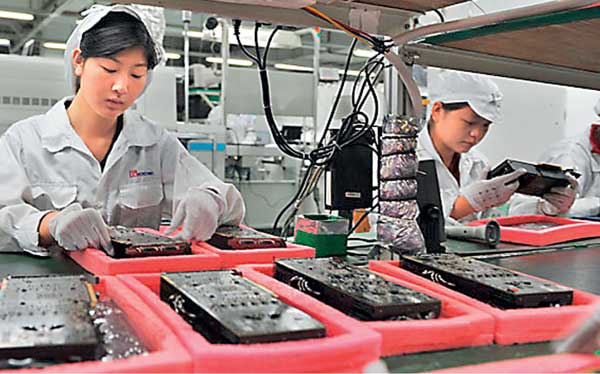28 Jul 2016 - {{hitsCtrl.values.hits}}
 In general, China has welcomed FDI into most but not all of manufacturing
In general, China has welcomed FDI into most but not all of manufacturing
By David Dollar
China is unusual in that it is a developing country that has emerged as a major investor. China itself is an important destination for foreign direct investment (FDI), and opening to the outside world has been an important part of its reform program since 1978. But China’s policy is to steer FDI to particular sectors.
In general, China has welcomed FDI into most but not all of manufacturing. But other sectors of the economy are relatively closed to FDI, including mining, construction and most modern services.
Relatively closed
It is not surprising that China is less open to FDI than developed economies such as the United States. But China is also relatively closed among developing countries.
The lack of reciprocity creates an un-level playing field. A concrete example is the acquisition of the US firm Smithfield by the Chinese firm Shuanghui. In a truly open market, Smithfield, with its superior technology and food-safety procedures, may well have taken over Shuanghui and expanded into the rapidly growing Chinese pork market. But investment restrictions prevented such an option, so the best way for Smithfield to expand into China was to be acquired by the
Chinese firm.
The United States does not have much leverage with which to level the playing field. It does have a review process for acquisitions of US firms by foreign ones. But it only reviews around 100 transactions per year and the majority of them proceed. This system reflects the US philosophy of being very open to foreign investment.
China’s policies create a dilemma for its partners. Taking those policies as given, it would be irrational for economies such as the United States to limit Chinese investments.
In the Shuanghui–Smithfield example, the access to the Chinese market gained through the takeover makes the assets of the US firm more valuable and benefits its shareholders. Assuming that the firm really does expand into China, the deal will then benefit the workers of the firm as well.
Better if it opened up
But it would be even better if China opened up its protected markets so that such expansions could take place in the most efficient way possible. In some cases, that will be Chinese firms acquiring US ones, but in many other cases, it would involve US firms expanding into China. This issue of getting China to open its protected markets is high on the policy agenda of the United States and other major economies. But so far, negotiations have been slow.
The issue of reciprocity should be an easy one for China. There is ample evidence that big state-owned enterprises (SOEs) are less productive than private firms in China. Many of the sectors that remain closed are service sectors such as finance, telecommunications, transportation and media — all dominated by large SOEs. With the shift in China’s growth model, these service sectors are now the fast-growing part of the economy, while industry is in relative decline. It will be easier for China to maintain a healthy growth rate if it opens these sectors to international competition, in the same way that it opened manufacturing in an
earlier era.
It will be natural for a new US administration to take a hard look at US–China economic relations, especially with the emergence of China as the world’s largest net creditor. The lack of reciprocity between China’s investment openness and the US’ system is a worrisome trend. The new US president will have to take a serious look at the processes and the enabling legislation and consider what combination of carrots and sticks would accelerate the opening of China’s markets.
In terms of sticks, the United States could limit acquisitions by SOEs from countries with which the United States does not have a bilateral investment treaty. In terms of carrots, the best move for the United States is to approve the Trans-Pacific Partnership and implement it well so that there is deeper integration among like-minded countries in the Asia Pacific.
Greater investment openness is part of China’s own reform plan but it clearly needs incentives to make real progress.
(Courtesy: East Asia Forum)
(David Dollar is a Senior Fellow in the John L. Thornton China Center at the Brookings Institution)
29 Nov 2024 21 minute ago
29 Nov 2024 1 hours ago
29 Nov 2024 2 hours ago
29 Nov 2024 3 hours ago
29 Nov 2024 4 hours ago